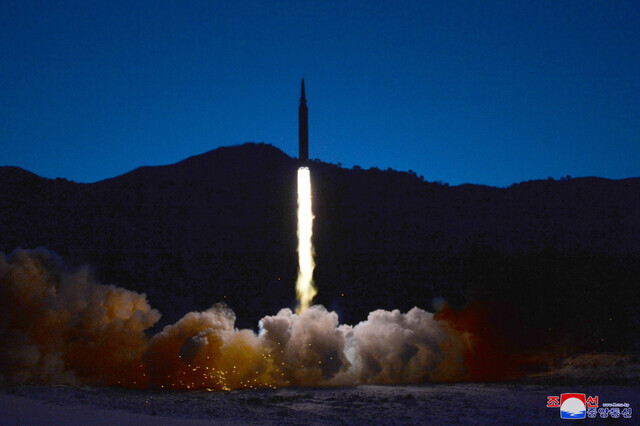US says new sanctions on N. Korea don’t close door for dialogue.This is the first time the Biden administration has sanctioned North Korea over its weapons program

Rodong Sinmun reported on their front page on Wednesday that North Korean leader Kim Jong-un had been present
at what they called a successful launch of a hypersonic missile on Tuesday. (KCNA/Yonhap News)
The Biden administration in the US has imposed independent sanctions against North Korea in response to the North’s repeated ballistic missile launches. The US also seeks to impose sanctions at the level of the UN Security Council.These steps represent a firmer response by Biden, who is abandoning the patience he’d maintained since taking office last January.
However, the Biden administration left the door open to North Korea by emphasizing that its policy remains focused on dialogue and diplomacy.On Wednesday, the US Treasury Department’s Office of Foreign Assets Control added six North Korean nationals, one Russian, and one Russian group to the sanctions list for their involvement in the North’s development of weapons of mass destruction (WMDs) and delivery systems — that is, ballistic missiles.
The Treasury Department said the individuals had been procuring materials related to nuclear weapons and missiles in Dalian, China, and Vladivostok, Russia.Five of the six North Koreans work at the Academy of National Defence Science, which leads weapons development in the North.Being added to the sanctions list freezes any assets these individuals may have in the US and bans them from doing business with Americans.
But since they’re unlikely to hold any assets in the US, the sanctions have no real effect.Even so, these are notable as the first sanctions the US has imposed on North Korea in connection with a ballistic missile launch since Biden took office. Last month, the Biden administration sanctioned individuals and groups in North Korea, China and Myanmar for human rights violations to mark Human Rights Day on Dec. 10.The Biden administration has called for dialogue after unveiling a North Korean policy based on a “calibrated, practical approach” to diplomacy at the end of April last year.
But North Korea has kept up a barrage of ballistic missiles tests since last March, including the Hwasong-9 — supposedly a hypersonic missile — in September, and a new submarine-launched ballistic missile in October. The Biden administration has nevertheless maintained its diplomatic approach by deliberating with South Korea about formally ending the Korean War.But after the successive test launches of hypersonic missiles on Jan. 5 and Tuesday, the US is now resorting to sanctions.
It appears to have concluded that it can no longer sit by as international opinion worsens over the test launches of powerful weapons that are difficult to detect or intercept.In a statement, US Secretary of State Antony Blinken said, “The United States will use every appropriate tool to address the DPRK’s WMD and ballistic missile programs, which constitute a serious threat to international peace and security and undermine the global nonproliferation regime.
” His remarks warned that additional sanctions and pressures could be applied in response to future launches by the North.Washington also indicated that it is pursuing new sanctions at the UNSC level.In a post to Twitter Thursday, US Ambassador to the UN Linda Thomas-Greenfield wrote that the US “is proposing UN sanctions following North Korea’s six ballistic missile launches since September 2021.”But amid their deteriorating relations with the US, it appears unlikely that either China or Russia would agree to new North Korea sanctions by the UN.
Historically, they have only agreed to UNSC sanctions when North Korea’s actions have crossed a “red line,” such as nuclear testing or test launches of intercontinental ballistic missiles.At the same time, Washington clarified that new sanctions would not signify a change in its North Korea policy. When asked in a briefing Wednesday whether there had been any change to US policies on North Korea, State Department spokesperson Ned Price said, “I would strenuously object to the idea that these sanctions indicate anything other than a genuine effort to constrain North Korea’s [. . .] ballistic missile programs.
”He added that the sanctions were “about our ongoing efforts to prevent the advancement of the DPRK’s WMD and ballistic missile programs.”Similarly, Blinken said in his statement that the US “remain[s] committed to seeking dialogue and diplomacy with the DPRK and call[s] on the DPRK to engage in negotiations.”With the US already facing off against China and Russia on two fronts in Ukraine and Taiwan, rising tensions on the Korean Peninsula as well would translate into a major headache.But if the North continues its provocative actions and ends up crossing the “red line” for the first time since 2018, the possibility of a vicious cycle emerging cannot be ruled out as the US feels obliged to take action in response.By Hwang Joon-bum, Washington correspondent
Soure:english.hani.co.kr


